The wines of the Valle Isarco have a "reputation like thunder", says wine journalist Martin Kilchmann in his book "Wine Culture South of the Alps". However, only "in Italy". In Germany, these sought-after wines are hardly known. This is not due to their quality. It's more the varieties that are found here: Sylvaner, Kerner, Riesling, Müller-Thurgau. These are not the wines one associates with Italy, not even with South Tyrol. But it's worth stopping off now and then on the way south before Bolzano and dropping in on one or more of the now very numerous producers from the Valle Isarco. You can't go wrong here, because everyone makes very good wine in his or her own way, and among the top producers you will find some of the best white wines in Italy.
In Bressanone/Brixen, after the phylloxera catastrophe in the mid-19th century, the wine culture was born that still characterises the Valle Isarco today. High-quality white wine varieties such as Sylvaner and Müller-Thurgau replaced the rather mediocre reds. Vineyards in the Eisack Valley took another quality leap in the early 90s of the last century, when small self-marketers entered the scene with exciting interpretations of classic Eisack Valley growths. In the meantime, wine is once again being cultivated even in the nearby Pustertal valley. First-class restaurants and wine taverns complement the high-quality wine on offer.
The Augustinian monastery of Neustift is one of the top wineries in the country, and that with the not inconsiderable amount of about 650,000 bottles produced here every year. All wines are in the upper category. Unlike other larger wineries, there is no basic line of simple wines here, but only two quality levels: The classic line and the prepositus selections, which make up 15 per cent of the range, depending on the vintage quality.
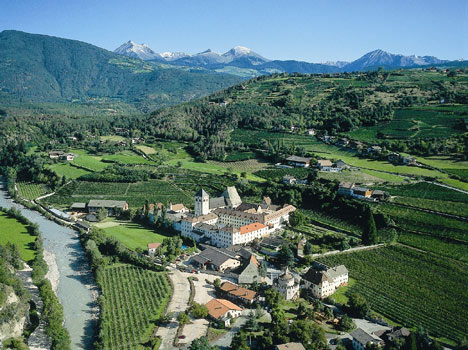
|
| Aerial view of Neustift Monastery (Source: Neustift Monastery) |
The basis for this quality was and is, in addition to good sites and skilful cellar work, a special relationship with the grape suppliers. The monastery owns only five hectares of its own vineyards in the Eisack Valley and has to buy a large part of its white wine grapes from local winegrowers. Unlike the so-called commercial wineries, however, the grapes are not purchased from individual suppliers, but from a cooperative that was founded especially for the monastery. All of the monastery's Eisack Valley grape suppliers are organised in this cooperative, even the monastery itself with its own vineyards. Unlike a normal cooperative, however, the grapes change hands here when they are delivered and everything that happens afterwards is decided by the monastery itself.
The advantage for the monastery: independence in its decisions regarding the development of the wines, product lines, marketing, etc. But the cooperatively organised suppliers also live well with this system. In addition to good payment, they also receive advice from the winery and special payments for particularly good quality.
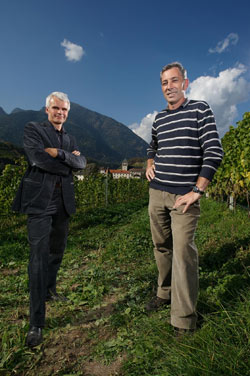
|
| The Neustift "doers": Abbey administrator Dr. Urban von Klebelsberg and cellar master Lucin Celestin (Source: Neustift Abbey) |
The wines of Neustift have been and continue to be showered with prizes and awards. At least one or even several wines from the Prepositus line are always at the top of all wine guides, and Celestin Lucin was named Cellar Master of the Year by Gambero Rosso in 2009. One takes note of this and is rather quietly pleased about it. More important here than loud publicity is the above-average quality of the wines, since their sale provides the main contribution to the upkeep of the monastery and its facilities (school, education centre, library, etc.), as well as a social relationship with the grape suppliers that is satisfactory for all sides.
In the monastery tavern, you can enjoy the monastery's wines by the glass with traditional Eisacktaler dishes and purchase them in the monastery shop at prices ranging from 7 to 25 euros.
The tavern is open from Monday to Saturday from 10 a.m. to 7 p.m. (closed on Sundays and public holidays). Guided wine tastings are offered for groups of 10 or more. Four wines (two reds and two whites) can be tasted. Duration approx. one hour. The cost is 7.50 euros per person. If desired, the tasting can also be combined with a short guided tour of the winery (extra charge 2.00 euros per person). In addition to the wines of the canons' monastery, there are more than 200 different products in the monastery shop.
Those who would like to learn more about the history and culture of Neustift Abbey can take part in a guided tour of the abbey lasting about one hour (see homepage).
Opening hours:
Monday - Saturday: 15 - 12:00 and 14:00 - 18:00; closed on church holidays, of course.
Tel: +39 0472 836 189 info@kloster-neustift.it www.kloster-neustift.it
The wines of Kloster Neustift in the Wein-Plus guide:
http://www.wein.plus/en/Stiftskellerei+Neustift_2
In the immediate vicinity of the monastery there are two addresses that every wine-interested traveller to the Isarco Valley should visit more than once: the Köfererhof run by the Kerschbaumer family and the Pacherhof run by the Huber family. Both offer excellent cuisine to go with their excellent wines. At the Pacherhof you can also stay in a wonderful location and wine-historical ambience.
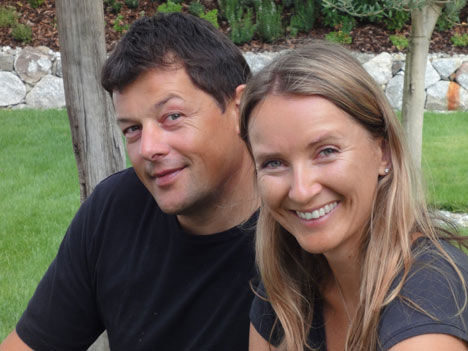
|
| Günther Kerschbaumer and his partner Gaby Tauber (Source: Roland Brunner) |
It is not meant to be an affront to Günther Kerschbaumer's excellent wines if I do not mention them first when describing the Köfererhof. It is simply because of the great restaurant that the Kerschbaumer family has been running above the Neustift monastery since 1992. If there were no other restaurant in the whole of Brixen and the surrounding area, you would probably still have no problem at all. Because what is offered here is so good and varied that you would like to go there every day to eat. The cuisine is high-quality and down-to-earth. In addition to traditional South Tyrolean fare, there are also Mediterranean dishes. And it's not just the quality that's right, but also the price, and the service led by mother Erika Kerschbaumer is simply remarkable: always present, cordial and attentive. And: all top-class white wines from the winery as well as excellent red wines from other wineries are offered by the glass; like the dishes, at very moderate prices. In a nutshell: a visit to the Köfererhof is a must. Also and above all, of course, because of the wines that Günther Kerschbaumer produces. He always wanted to make his own wine, and has been doing so since 1995. Because "as a member of the Neustift grape growers' cooperative, I worked in the vineyard all year, produced high-quality grapes, then delivered them and waited for the payout. That was not what I like to do. I want to have the result of my work in my own hands," and Günther Kerschbaumer loves the risk that comes with self-employment. You can't tell by looking at the quiet, rather reserved man, but he is - as one of his colleagues respectfully remarked to me - a "gambler" who is not afraid to take risks in order to achieve the quality he wants. Even when things get critical, he lets the grapes hang for a very long time to get the quality he wants in the bottle. He wants "full-bodied, animating, mineral wines that are juicy and elegant. That go well with both hearty, rustic South Tyrolean cuisine and elegant, fine Mediterranean cuisine."
Only white wines are produced: Sylvaner, Kerner, Gewürztraminer, Pinot Grigio, Müller-Thurgau, Riesling and Veltliner. The grapes come from 5.5 hectares of the estate's own vineyards and from 4 hectares cultivated by the neighbour according to Günther Kerschbaumer's specifications. From these, 70,000 bottles are produced. A maximum of 90,000 bottles is planned for the future.
The farm-gate prices range from 7.80 (Müller-Thurgau) to 16 euros (Sylvaner "R").
Pustertalerstraße 5; 39040 Vahrn
Tel: +39 0472 836649; Fax: +39 0472 836248;
info@koefererhof.itwww.koefererhof.it
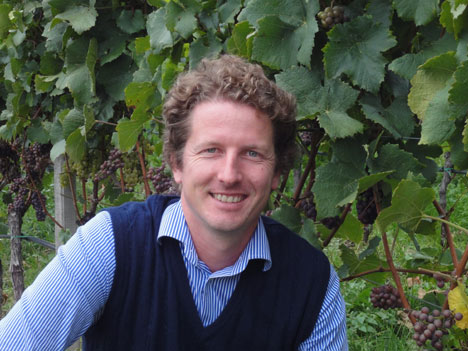
|
| Andreas Huber (Source: Roland Brunner) |
Calm, serene, attentive - this is the best way to describe the atmosphere and the people on the Pacherhof. The people, that is currently two generations of the Huber family, who run this historic farm as a winery and hotel-restaurant. The Pacherhof has a tradition that goes back to the 11th century and is thus older than that of the neighbouring Neustift monastery. At the end of the 19th century, the then owner Josef Huber, together with Johann Huber from Elvas, brought the grape variety to the Isarco Valley that still defines the image of this growing region today: the Sylvaner. Today, Andreas Huber is responsible for the wine. He learned his trade at the Veitshöchheim viticulture school near Würzburg and, in addition to the Sylvaner, of which he presses a Auslese from the oldest vines in addition to the basic version, he focuses primarily on Riesling and Kerner. Andreas Huber has learned viticulture thoroughly and with great attention. You can sense that when he goes into details in conversation. His initial reticence gives way to an unstoppable need to communicate. He has precise ideas about the taste of each variety, and he knows exactly how to achieve his goals. His goal is "supple wines with pronounced fruit and minerality. A 'masculine' Riesling, a 'feminine' Sylvaner and a finely aromatic but never obtrusive Kerner," to stick with the varieties that are most important to him.
Like the neighbouring Köfererhof, the Pacherhof offers excellent cuisine in a cosy atmosphere. The flair of the well-kept old parlours, combined with the attentive service of the daughters of the house, as well as the traditional, fine South Tyrolean cuisine and the fine wines not only, but especially of the house, are the guarantees of enjoyment here. The restaurant is only open to hotel guests. The hotel itself offers 22 comfortable rooms and suites as well as a wellness area. All this in a prime location and at reasonable prices.
Sales and tasting by appointment. Prices range from 9.20 to 12.80 euros.
Pacherweg 1; 39040 Neustift/Vahrn
Tel: +39 0472 835717 - Fax: +39 0472 801165
info@pacherhof.comwww.pacherhof.com
The wines of the Pacherhof in the Wein-Plus Guide:
There are four self-marketing farms in Brixen and north of it, and they all produce remarkable wines. Each in its own very individual way.
If you hear something striking, provocative, sometimes even irritating from the South Tyrolean wine scene, it is most likely to come from Manni Nössing. He doesn't mince his words and occasionally overshoots the mark verbally. However, one should not pay too much attention to how he says something, but what he says. Viticulture is his life and therefore a serious matter for him,
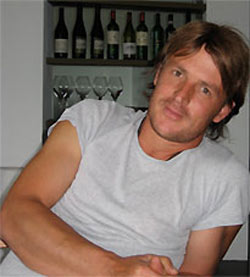
|
| Manni Nössing (Source: M.Nössing) |
Manni Nössing is a man of conviction. If he thinks something is right, he does it, even ruthlessly against his own financial advantages. For example, he stopped the production of the red wine cuvée "Espan", with which he had "a very good start" at the beginning of his work in 1997, but which did not convince him in the long run because of its varietal genetics. So in the meantime he only grows white wines.
In Italy, Manni Nössing is also called "Mr. Kerner", because here this slightly aromatic wine is the most sought-after growth of the Hoandlhof. For Manni Nössing himself, Grüner Veltliner is qualitatively the most important. Sylvaner, Gewürztraminer and, from 2011, Riesling are also grown. Currently, about 50,000 bottles are produced per year on the 5.5 hectares of vineyards owned by the estate.
Farm-gate sales are only possible by telephone arrangement. In the vinotheque, the wines cost between 11 and 14 euros.
Weinbergstraße 66; 39042 Brixen
Tel/Fax: +39 0472 835993; mobile: 0039 3355935111
manni.vino@tiscali.itwww.manni-noessing.com
In 2003, the Strasserhof was an ideal place for a winegrower who wants to pursue his work in peace without stress and who values a secure income. 90 percent of the grapes were delivered to the Neustift monastery, which paid well for them; the remaining 10 percent was usually drunk up far too early in the year by the always thirsty customers of the well-visited Buschenschank. What more could you want? Hannes Baumgartner wanted more and decided that year to give up the secure source of Neustift and to press and market his wine himself. At that time, the latter was no longer as easy as it had been in the
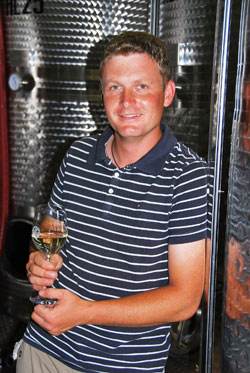
|
| Hannes Baumgartner (Source: H.Baumgartner) |
Baumgartner produces six white wines and one red. The latter, however, is only sold directly on site at the Buschenschank. Here, in what was until recently Italy's northernmost winery, only the white varieties produce the qualities that meet Hannes Baumgartner's demands. The varieties grown are Sylvaner, Kerner, Riesling, Veltliner, Müller-Thurgau and Gewürztraminer. Each enjoys the same attention in the cellar. However, the first four are the most expressive. The majority of the vines are still very young and therefore produce fresh, fruity wines with elegance and a beautiful play of acidity. However, these characteristics should also characterise the style of the wines in the future. Even though the quality will increase with the age of the vines and the wines will show more complexity, they should always be recognisable as racy, typical growths of the upper Eisack Valley. The Strasserhof will certainly be heard of more often in the future when there is talk of high-quality South Tyrolean wines.
The farm-gate prices are between 7 and 12 euros
Unterrain 8; 39040 Neustift/Vahrn
Tel/Fax: +39 0472 830804
info@strasserhof.infowww.strasserhof.info
The wines of the Strasserhof in the Wein-Plus Guide:
http://www.wein-plus.de/italien/Weingut%2BStrasserhof_56043.html
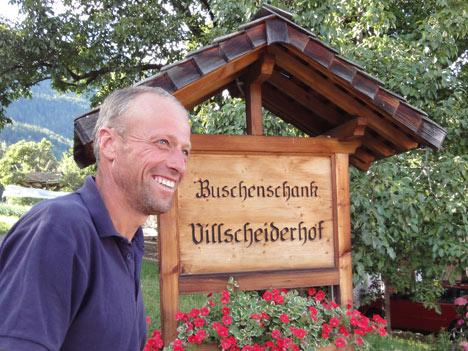
|
| Florian Hilpold (Source: Roland Brunner) |
Florian Hilpold has only been bottling and selling his wine under his own label for four years. In this short time, however, he has already managed to make a good name for himself in an increasingly difficult market. The fact that his wines are distributed by two of Italy's most renowned distributors has certainly contributed to this rapid success. Florian Hilpold has not taken off despite this vertical start. He probably can't do that at all, because he's simply not the type. He feels comfortable on the Villscheiderhof as it is, and that is why the farm structure is not to be changed in the future. The main source of income are the apples and the Buschenschank, which is mainly frequented by locals. Not only the wine comes from the farm's own production, but also all the juices, the bacon, the bread, the potatoes, the sauerkraut and other vegetables and fruits. The wine production of 5,000 bottles per year is not to be increased in the future, so that the wines of the house will continue to be rarities that are best enjoyed and bought on site. Florian Hilpold appreciates producing good wine, but it is also important to him "to do everything else we have always done on our farm". Moreover, wine production on the steep slopes of the Villscheiderhof is extremely labour-intensive. Everything has to be done by hand. In order to be able to use machines, the vineyards would first have to be terraced, which is what is to be done in the future - at least in part. "But that also costs time and money," says Hilpold. Currently, three white wines are grown: Kerner, Sylvaner and Gewürztraminer. In the future, it will only be the first two, as well as some red wine, which, however, will only be sold openly in the Buschenschank. The wines of the Villscheiderhof are fruit-intensive, full-bodied growths that are, however, well balanced with fine acidity and minerality. Sometimes they turn out a little strong, especially the Kerner. In 2009, this wine reached 15 per cent alcohol and still had 9 grams of residual sugar, which is naturally noticeable in the taste. The Sylvaner from the same year, on the other hand, presented itself wonderfully harmonious as an elegant, drinkable wine despite its intense fullness. "These vintage characteristics should be noticeable in the wine. First of all, I find that very important and secondly, extremely appealing and I don't want to change anything. And with the small amount of wine I have to sell, I don't have any problems commercially if I make the wines the way I want."
The wines cost between 8 and 12 euros ex farm. Wine tasting on sale and guided tours by appointment - maximum 20 people.
Fraktion Untereben 13; 39042 Brixen
Tel/Fax: +39 0472 832037
villscheiderhof@akfree.it
Willy Gasser has been producing his own wine on the Santerhof since 2008. The farm is located at the entrance to the Puster Valley, where one would actually not expect to find any vineyards, and is thus the most northerly winery in Italy. There was some wine growing here before the First World War, but after the war, when South Tyrol was annexed to Italy, the trade routes were cut off for the time being, which is why the wine industry came to a standstill. The
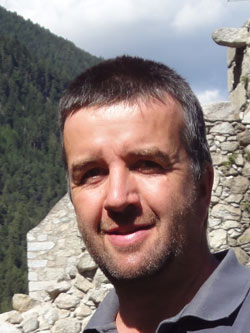
|
| Willi Gasser (Source: Roland Brunner) |
Wine production at Santerhof is still in its infancy. Many plants are not yet in production. Therefore, in the next few years, there will still be some changes in the range of wines and in the composition of the varieties for the red wine cuvée. In any case, a remarkable start has been made, and the Santerhof is already worth the detour to Pustertal.
The wines cost 13 euros ex farm.
Tasting and direct sales by appointment.
Pustertaler Straße 40; 39037 Mühlbach
Tel/ Fax: +39 0472 849632
bio@santerhof.eu www.santerhof.eu
The Vonklausner winery was founded in 1962 by Karl Vonklausner, the father of the current owner Christian Vonklausner, making it one of the older businesses in the Eisack Valley. Over the years, a wholesale beverage business with an extensive range of products was built up at the same time. For some years now, son Christian has made it his task to restructure the business in the direction of quality wine production. This means that the grape suppliers - "all of them long-standing suppliers with whom there is no contractual connection, but a trust based on the long cooperation" - have to be sworn in to the new company philosophy. To this end, "we also advise them so that they work in the vineyard according to our wishes and the grape material corresponds to our ideas," says Christian Vonklausner. Four typical white wines of the Valle Isarco are offered: Sylvaner, Müller-Thurgau, Kerner and Gewürztraminer. At the moment there are about 70,000 bottles per year.
Tasting possibility and sale in the winery.
Opening hours: Monday - Friday 8.00 - 12.00 and 13.30 - 18.00, Saturday 8.00 - 12.00.
Köstlanerstraße 30/A; Brixen
Tel: +39 0472 833700
info@vonklausner.itwww.vonklausner.it
There are many very good restaurants in Brixen and the surrounding area. The restaurants listed are those I was able to visit myself. If you are curious, the winegrowers will provide you with many more addresses where you can enjoy eating and drinking.
Traditional restaurant in the historic old town. Varied cuisine ("South Tyrol with a touch of Italy") at a high quality and rather moderate price level. The same applies to the wine selection. The focus is naturally on Eisacktaler growths among the whites and South Tyrolean among the reds. Many high-quality wines are offered by the glass. A must: the products of the in-house pastry shop.
Cuisine from 11:00 to 22:00; closing day Tuesday evenings and Wednesday
Kleine Lauben 4, Brixen
Tel. +39 0472 834883, Fax: +39 0472 835268
info@restaurant-fink.itwww.restaurant-fink.it
The institution in Brixen. A mixed crowd has always met here. Locals, travellers and artists. That's why the restaurant is also called Künstlerstübele Finsterwirt. The artists used to be able to settle their bills with their works, which is why a lot of valuable things have accumulated in the "Oste Scuro". Great value is placed on regional products, which the kitchen prepares in a decidedly creative, "artistic" way. The wine selection is excellent. Many high-quality wines are served by the glass.
Opening hours: 11:45 - 14:15 and 18:45 - 21:15. Closing day: Sunday evening and Monday (except public holidays)
Domgasse 3, 39042 Brixen
Tel. +39 0472 835343
info@finsterwirt.comwww.finsterwirt.com
Buschenschank in the Kranebitt district above Brixen right next to Manni Nössing's Hoandlhof. South Tyrolean/Eisacktal classics at very moderate prices. Pleasant atmosphere with a beautiful view of the town. Good wines from their own production and a cultivated selection of South Tyrolean and Italian growths. The owner, Hans Pichler, is a great Sylvaner lover and always organises a comparative tasting of all Eisacktaler Sylvaners in July. Overnight accommodation in the house.
Weinbergstraße 68, Brixen/Kranebitt
Tel. +39 0472 834601, Fax +39 0472 208294
info@gasthof-haller.comwww.gasthof-haller.com
A little below the Hallerhof lies the traditional Sunneg Inn, also a more upmarket wine tavern with a wonderful view of the valley. Great importance is attached to seasonal dishes. Asparagus in spring, light meals in summer, chestnuts and slaughter platters in autumn, and mainly game in winter. In addition to the house's own Sylvaner and Zweigelt, there are several high-quality bottled wines. Overnight accommodation in cosy holiday flats.
Closed: Wednesday and Thursday at noon
Weinbergstraße 67, Brixen/Kranebitt
Tel. +39 0472 834 760, Fax: +39 0472 208 357
gasthof.sunnegg@rolmail.netwww.sunnegg.com
See description above of the Köfererhof.
100 seats in several restaurants and 70 outside.
Warm cuisine from 12.00 to 14.00 and from 18.00 to 22.00, closed on Tuesdays.
Pustertalerstraße 5; 39040 Vahrn
Tel: +39 0472 836649; Fax: +39 0472 836248;
info@koefererhof.itwww.koefererhof.it
See description above for Pacherhof.
Pacherweg 1; 39040 Neustift/Vahrn
Tel: +39 0472 835717 - Fax: +39 0472 801165
info@pacherhof.comwww.pacherhof.com
Strictly speaking, the Strasshof does not belong to Brixen. It is located in Mühlbach at the entrance to the Pustertal valley. But that is not far away. And even if you had to make a somewhat longer diversions, the Strasshof would be worth it. On the one hand because of the quality of the cuisine, but on the other hand also because of its special style. This is where South Tyrol meets Sardinia! Maurizio Basso, who grew up in the Pustertal, and the Sardinian Loredana Murru offer a successful combination of these two - each in its own way "un-Italian" - regions. However, there is no South Tyrolean-Sardinian "crossover". All specialities are served in their original versions. Schlutzkrapfen and Culurgines, Orecchiette and South Tyrolean Gröstl - all an authentic delight. The same goes for the wines. The best of both worlds at moderate prices. Two holiday flats are available for overnight stays.
Wednesday closing day
Spingerstraße 2, 39037 Mühlbach/Pustertal
Tel. +39 0472 886142
Three things are important for a visit to the Schatzerhütte: a healthy appetite, time and some fitness. The hut is not accessible by car. You have to park your car about half an hour's walk away. However, you don't necessarily need to be fit to get to the hut, as you can be picked up on request. But the surroundings are so fantastically beautiful and the portions so generous that you absolutely have to hike and for that you should take more than one/two days. The food on offer doesn't get boring even after a week. Because Franz Permthaler cooks a completely different menu every evening. In the course of a week, not a single dish is repeated. And what he cooks is sensationally good. Franz has learned his trade in star kitchens (including Munich's Tantris) and he is extremely happy to show what he can do. At the price of half board (33 euros!), you wonder how he does it. But he does.
Schatzerhütte 39040 Afers
Tel./Fax +39 0472 521 343
www.schatzerhuette.com
In the case of the Pretzhof, I make an exception to the rule that I have visited each of the establishments described here myself. Something always came up. But in the meantime it has been recommended to me by so many producers (not only from South Tyrol) as well as by competent friends and acquaintances that I simply have to mention it, and I hope to be able to visit it soon if possible. It must be really extraordinary what is on offer here.
Opening hours: continuously from 12.00 to 21.00 Rest days: Monday and Tuesday.
Tulfer 259, 39040 Wiesen/Pfitsch
Tel. +39 0472 764455, Fax +39 0472 067181
info@pretzhof.comwww.pretzhof.com
Every year on the last Friday in July, all the producers of the Valle Isarco present their current wines under the arbours in the old town of Bressanone. From 7 p.m. to 11 p.m., you can get to know and enjoy the whole range of Valle Isarco wines in a pleasant atmosphere. An opportunity not to be missed.
This year the event will take place on Friday 29 July.
Information:
Tourismusverein Brixen, Regensburger Allee 9, 39042 Brixen
Tel. +39 0472 836401, Fax +39 0472 836067
info@brixen.orgwww.brixen.org
In August, the wineries in and around Neustift present their wines on the village square in Vahrn as part of the "Vahrner Weis(s)e" event.
Information from one of the participating wineries (Neustift Winery, tel. +39 0472 836 189, info@kloster-neustift.it; Pacherhof, tel. +39 0472 835717, info@pacherhof.com; Köfererhof, tel. +39 0472 836649, info@koefererhof.it; Strasserhof, tel. +39 0472 830804, info@strasserhof.info)
Tourist Office Brixen
Regensburger Allee 9, 39042 Brixen
Tel. +39 0472 836401, Fax +39 0472 836067
info@brixen.org www.brixen.org
Tourist Office Klausen, Barbian, Feldthurns, Villanders
Marktplatz 1, 39043 Klausen
Tel. +39 0472 847 424, Fax +39 0472 847 244
info@klausen.itinfo@barbian.it www.klausen.it
Freie Weinbauern Südtirol
Association of currently 82 self-marketing South Tyrolean wineries. An absolute must for every South Tyrolean wine lover: the Vinea Tirolensis, at which almost all member wineries present their current wines. This year the event will take place on 22 August at Autocity Barchetti in Bolzano.
Tel. +39 0471 238002, Fax +39 0471 238 242
info@fws.itwww.fws.it
Roter Hahn
Arranges farm accommodation in South Tyrol. Among them also many rural wine producers. The quality criteria are very strict and are checked annually.
Tel. +39 0471 999325, Fax. +39 0471 981171
info@roterhahn.itwww.roterhahn.it
To the second part of the Eisacktal reportage
To the third part of the Eisacktal reportage